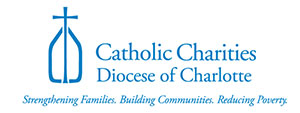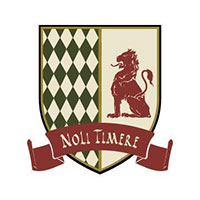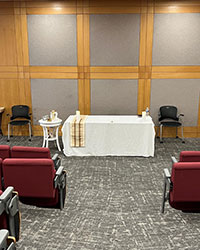CHARLOTTE — As Advent quickly approaches, so does a day of great generosity. Save some money after shopping Black Friday and Cyber Monday to give back to Catholic-related charitable efforts on Tuesday, Nov. 29.
The Tuesday after Thanksgiving has become known as “Giving Tuesday.” Catholics can focus their charitable giving on this day in numerous ways.
Campaigns such as #iGiveCatholic, originally launched in 2015 as a 24-hour fundraiser to benefit the Catholic Community Foundation of the Archdiocese of New Orleans, have grown into a broader social media movement that resonates with people who want to combat the commercialization and consumerism that have attempted to overtake the true meaning of Christmas.
 There are several local Catholic-related charitable efforts you can consider giving to this season, including Catholic Charities Diocese of Charlotte.
There are several local Catholic-related charitable efforts you can consider giving to this season, including Catholic Charities Diocese of Charlotte.
Thanks to your support, Catholic Charities helped almost 15,000 participants of all ages across the 46 counties in the diocese last year through more than a dozen services and programs to strengthen families, build communities and reduce poverty – including food pantries, mental health counseling and veteran services.
Find ways to help and donate to Catholic Charities at www.ccdoc.org/donate.
 Another option to consider is St. Joseph College Seminary. This year the seminary is raising funds for a new vehicle.
Another option to consider is St. Joseph College Seminary. This year the seminary is raising funds for a new vehicle.
“Our old bus is falling apart, and we do not want to continue putting the whole seminary on the same vehicle in case something bad happens,” said Father Matthew Kauth, rector of St. Joseph College Seminary.
“Our goal is to raise $50,000 for a new vehicle, an eight-seater Suburban, for the seminary.” This year, St. Joseph College Seminary has 49 young men in formation, the most in its history.
Needing the vehicle to travel frequently throughout the diocese, the seminarians are hoping to meet their goal on Giving Tuesday in order to continue on with their formation and apostolic activities. To donate, visit www.stjcs.org/donation.
Also consider Holy Angels in Belmont. Its mission is to provide compassionate, dependable care and opportunities for high-quality living to those with intellectual developmental disabilities and delicate medical conditions through physical, social, spiritual, educational, vocational and emotional support. Find out more and donate at https://www.holyangelsnc.org/donate.
Another option is the Airport Chaplaincy at Charlotte Douglas International Airport.
While the chaplaincy is non-denominational in its mission to serve airport travelers and employees, deacons of the diocese are closely involved in its work.
The ministry has organized nearly 300 Masses and prayer services, ministered to 1,375 visitors and prayed hundreds of prayer requests from employees and travelers this year.
 A 30-minute Catholic Mass is celebrated every Sunday at 8:30 and 10:30 a.m. at the Charlotte Douglas International Airport auditorium. (Photo via Facebook)Chaplains volunteered more than 2,600 hours ministering to people who travel and work at the airport, one of the nation’s busiest, and their work has been especially crucial in response to the economic impacts caused by the pandemic.
A 30-minute Catholic Mass is celebrated every Sunday at 8:30 and 10:30 a.m. at the Charlotte Douglas International Airport auditorium. (Photo via Facebook)Chaplains volunteered more than 2,600 hours ministering to people who travel and work at the airport, one of the nation’s busiest, and their work has been especially crucial in response to the economic impacts caused by the pandemic.
Consider donating to this ministry by going online to www.cltairportchapel.org.
Other options to “give Catholic” on Giving Tuesday include:
- Catholic Campus Ministry
- Catholic Schools
- Catholic Conference Center improvements
- Charlotte Catholic High School’s capital campaign
- Christ the King High School’s capital campaign
- Diocesan Support Appeal (DSA)
- Eucharistic Congress
- Priests’ Retirement and Benefits Collection
- Seminarian Education
- Donate a one-time gift or set up a recurring gift to your parish
Find links to donate at www.charlottediocese.org/development/ways-to-give
— Kimberly Bender
 In November, the Church celebrates the feast day of St. Charles Borromeo, whose contributions to the Council of Trent are noteworthy. The saint also had an interesting family tree: His uncle was Pope Pius IV and his nephew was Carlo Gesualdo, a composer who became infamous as a murderer.
In November, the Church celebrates the feast day of St. Charles Borromeo, whose contributions to the Council of Trent are noteworthy. The saint also had an interesting family tree: His uncle was Pope Pius IV and his nephew was Carlo Gesualdo, a composer who became infamous as a murderer.
Gesualdo, prince of Venosa, had incredible religious figures on both sides of his family. Besides his great-uncle the pope and St. Charles Borromeo, for whom he was named, he had a paternal uncle who served as dean of the College of Cardinals and later as archbishop of Naples.
Despite these holy family relations, Gesualdo led a troubled, inglorious life. He married his cousin at a young age and, when he discovered she was being unfaithful, he surprised his wife and her lover in an amorous moment. He killed them both on the spot. A widely publicized investigation of the sordid incident determined that the killing was justified, and Gesualdo was not charged.
His second marriage was only marginally more successful. He was physically abusive and unfaithful with a mistress who was accused and convicted of witchcraft. His second wife was terribly unhappy and went to great lengths to avoid living with him. Highly unstable, Gesualdo was a masochist who hired men to stay in his vicinity and ferociously beat him several times a day.
What is most interesting is his relationship to his uncle, the future St. Charles Borromeo, who was canonized in 1610. The composer died shortly afterwards in 1613, and his final wishes included a church to be built in his late uncle’s honor. Additionally, the composer commissioned a painting in 1609: “Il Perdono” (“The Pardon”), for its Santa Maria delle Grazie chapel. At the top of the painting is Christ, and counterclockwise to Him is Our Blessed Mother and St. Francis, to whom Gesualdo had a strong devotion. In the bottom left of the painting, Gesualdo kneels penitentially next to Borromeo, who is presenting him to Christ.
The fame of Gesualdo’s music lies primarily in his secular madrigals, which are extremely dissonant – so much so that nearly 200 years after they were composed, the famous English historian Charles Burney found them impossible to understand. Gesualdo also published three volumes of sacred music, all after 1600, in a style that is less dissonant than his secular music. A fine example is “O vos Omnes,” with a text from Lamentations 1:12, that Gesualdo wrote 10 years before his death in 1613. There are five voice parts – soprano, alto, tenor, quintus (or tenor II) and bass – with a scoring that focuses on the lower ranges to provide a darker sound. Also standard is the text painting with harsh intervals on “dolor” (sorrow).
Although it is only speculative, some scholars have viewed such works as “O vos Omnes” as evidence of Gesualdo’s remorse. The translation “O all ye that pass by the way, attend and see if there be any sorrow like to my sorrow” certainly gives one pause.
One may think it would be easy to become a saint if two of your uncles were archbishops and your great-uncle was a pope, yet Gesualdo shows us that holiness is not genetic.
— Christina L. Reitz, Ph.D.
More online
Listen to “O vos Omnes” by Carlo Gesualdo, the nephew of St. Charles Borromeo.
BELMONT — Belmont Abbey College has added three master’s degrees to its academic offerings: Master of Business Administration (MBA), Master of Leadership (MA in Leadership), and Master of Strategic Analysis.
These new graduate degrees, in addition to the existing Master of Health Administration (MHA) and Master of Science in Nursing (MSN), are part of the college’s objective to prepare students to create a better world for themselves and their communities and equip them to lead without compromising their values, the college noted in a recent release. The new graduate degrees are designed to be completed within one year.
“As a Catholic academic institution, we believe in providing quality education with a moral foundation that will help solve societal problems. We are thrilled to offer degrees that are dedicated to producing the kinds of organizational leaders the world needs,” said the school’s provost, Dr. Travis Feezell.
In its release, the college noted the cross-disciplinary online MBA program aims to equip students in key business areas such as managerial finance, strategic marketing management, and corporate governance and law. The MA in Leadership program at Belmont Abbey prepares students to lead organizations ethically and effectively while demonstrating the concept of servant leadership. Guided by Benedictine values, this program encourages and inspires leaders and other business stakeholders to see challenges and opportunities, to judge them according to the ethical social principles illuminated for Christians by the Gospel, and to act as leaders who serve God in all things.
The MS in Strategic Analysis degree supports its students’ work within organizations in their journey to search for and live in response to truth – specifically, understanding and engineering the evaluation, management and improvement of decisions and outcomes.
For more information, go to www.bac.edu/academics/majors-degrees.
— Catholic News Herald

